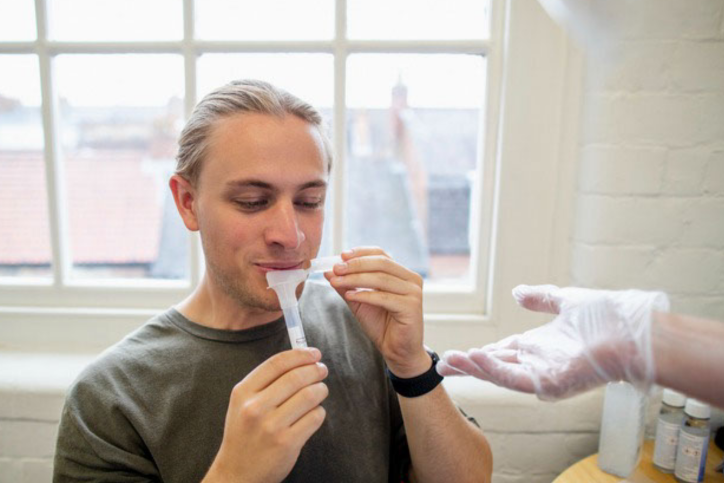Media Contact:
Jill Sirko, jsirko@forsyth.org
Cambridge, Mass. – Imagine going to the dentist for a cleaning, giving a sample of your saliva, and coming out of the appointment with comprehensive information on your oral health – your risk for cavities and gum disease – and on systemic diseases like diabetes, heart disease, and cancer. This kind of diagnostic tool would revolutionize oral care, and provide early detection of disease without the pain, hassle, and cost of bloodwork.
Scientists from the Forsyth Institute are working to make this point-of-care diagnostic experience a reality. Their study, “Rapid specific detection of oral bacteria using Cas13-based SHERLOCK,” published today in the Journal of Oral Microbiology, demonstrates the CRISPR-based technology can be adapted to detect specific oral pathogens in around 30 minutes. The technology could potentially transform the field.
“Targeted treatments are only possible when you know which bugs are in the mouth. In any disease, we cannot begin to create effective treatments until we have diagnostics,” said Dr. Batbileg Bor, who led the study and is an Assistant Member of Staff at Forsyth. “Currently, available tests on the market are either low sensitivity or require analysis at an expensive centralized laboratory. It can take months to get the results. The studied detection tool solves both problems, featuring high-sensitivity, low-cost tests with rapid results.”
Specific High-sensitivity Enzymatic Reporter Unlocking (SHERLOCK) is a CRISPR-Cas based molecular diagnostic platform, meaning that it can specifically and accurately target RNA and DNA molecules sequence-specific manner. The team adapted this technology to target 4 oral bacteria known to cause oral diseases, like periodontitis (gum disease) and cavities.
Around 3.5 billion people globally currently suffer from oral diseases. Gum disease, for instance, affects 65% of the aging population in the U.S., and there is currently no cure for it. Untreated gum disease damages the soft tissue around the teeth and destroys the bone, loosening teeth and causing them to fall out.
Many oral bacteria are also implicated in systemic diseases. In the current study, the scientists included three bacteria that can be associated with various cancers, digestive diseases, cardiovascular diseases, and neurodegenerative diseases. The results show remarkable potential of the diagnostic tool to be modified to detect any biomarker from saliva, including inflammatory and cancer markers.
“The test is so sensitive it can detect as little as 10s of bacteria cells of a certain type from a sample that might contain around 200 species of bacteria commonly found in your mouth,” said Dr. Bor. “We were able to target and detect specific bacteria in unprocessed saliva, meaning we could get this level of sensitivity and specificity without having to additionally process the saliva sample.”
Using this novel detection methodology, a person could simply spit in a tube and get highly accurate results in a very short time. This test could be performed in a dental office without any technical expertise.
“Once this tool is fully developed, it will change your dental experience. While your teeth are cleaned, the dentist can also provide you with all the biological information related to your oral and overall health.” said Dr. Wenyuan Shi, a microbiologist and President and Chief Executive Officer at Forsyth.
For Dr. Shi, the success of this project realizes a lifelong dream. “I was working on saliva tests over 20 years ago. Our test worked in the sense that it could detect a specific pathogen from the sample. It was inexpensive and fast, but not very sensitive. The technology Forsyth is developing is a giant step for the field of oral medicine.”
This work is supported by a grant from the Bingham Trust.
###
About the Forsyth Institute
The Forsyth Institute, founded in 1910, is the world’s leading independent research institution focused on oral health and its connection to overall wellness. Forsyth was founded as a pediatric dental hospital serving disadvantaged children in the Boston area. Today, the Institute is grounded in a 3-pillared strategic plan focused on biological research, clinical service and public health outreach, and technological innovation. Forsyth conducts its original mission through a mobile public health dental program called ForsythKids.

